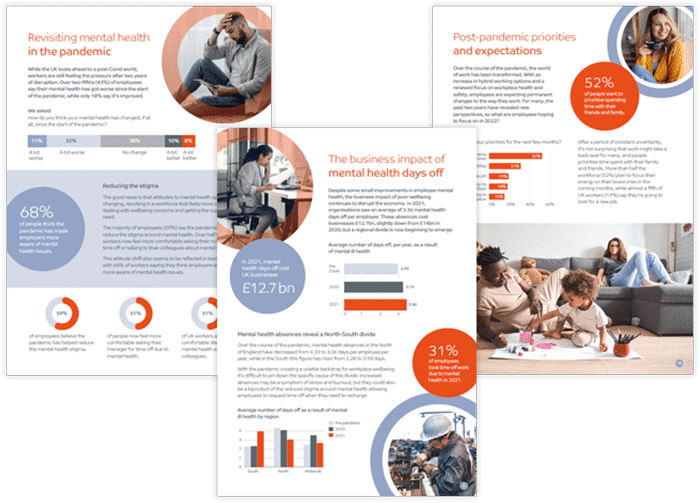Our latest report, Our Changing Attitudes to Mental Health, explores how workplace wellbeing has transformed over the past two years. As the pandemic continues to shape our working lives, bringing mental health to the forefront like never before, employees are likely to have new perspectives which place more value on their own health and wellbeing.
Many have found that their mental health has got worse since the start of the pandemic, leading to them taking more mental health days off. But with wellbeing high on the corporate agenda, attitudes are beginning to change, and many employees say they finally feel more comfortable seeking the help they need.
Employee mental health remains a concern, but the stigma is reducing
Our research found that the majority of employees say their mental health impacts their productivity at work sometimes, with 44% saying it affects them at least once a week. Only 29% say their work is never affected by their mental health, so employers who invest in mental health support are likely to notice a big impact not only on employee wellbeing but also in terms of productivity and business performance.
While inclusive workplace wellbeing support remains a challenge for businesses up and down the country, the good news is that over two-thirds (67%) of those surveyed said they feel that employers are becoming more aware of mental health in general.
With the pandemic shining the spotlight on common wellbeing issues, around half (51%) of employees feel more comfortable asking for time off due to their mental health. Additionally, 59% say the stigma around mental health is reducing, especially in the South of England where this figure rose to 64%.
Using employee feedback to help tailor your support
These new attitudes provide a key opportunity for employers to improve their workplace culture. With the mental health stigma reduced, people managers should be able to provide more robust employee wellbeing support.
Still, this shouldn’t be a one-size-fits-all approach. Some employees may remain reluctant to speak candidly about their mental health, so it’s important to get feedback from the individuals in your team. Pulse surveys, 1:1 chats and focus groups are all great ways to engage your workforce, but sometimes a simple chat over the coffee maker is where people truly open up. And with over half (51%) of employees saying they now feel more comfortable discussing mental health issues with colleagues, you never know who might be looking for an opportunity to start the conversation.
If your employees seem keen to share their views, now might be a good time to revisit your existing wellbeing strategy and gather feedback on how it can be improved. With people willing to speak more openly about their mental health, they’re likely to have new perspectives to offer based on their experiences throughout the pandemic.
A few quick wins and further reading
In light of your conversations with your team, consider how a few quick wins could be introduced and tailored to suit your people. Offering ‘mental health days’ as an addition to your annual leave policy is a great way to encourage transparency around wellbeing.
Training a team of in-house Mental Health First Aiders can provide another avenue for colleagues to support each other when things get tough. Whatever wellbeing support you introduce, be sure to check in with employees regularly to measure its impact and help you make any further adjustments.
For more tips and information about how workplace wellbeing is changing in the post-Covid world, you can read our latest research in full: Our Changing Attitudes to Mental Health.

Comments
It’s great to see the stigma around mental health in the workplace decreasing! Employers should definitely prioritize open conversations and support systems to help their employees. Mental health resources, training for managers, and creating a culture of trust can make a big difference. Let’s keep pushing for positive change!
I think it’s great to see more openness about mental health at work! Employers should definitely prioritize resources and support for their teams. It’s crucial for overall wellbeing and productivity.